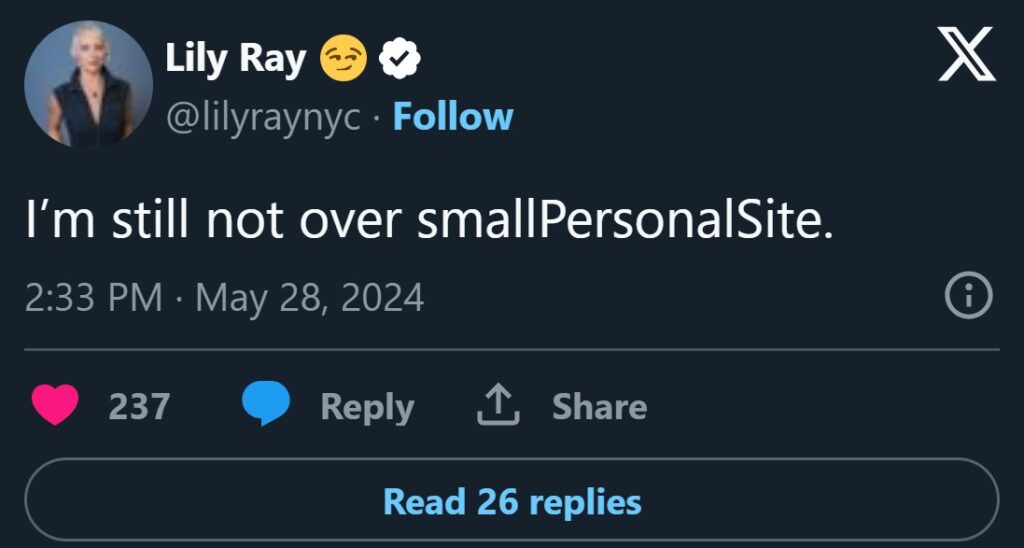In a shocking turn of events, a trove of leaked Google documents has surfaced, providing an unprecedented look into the inner workings of Google’s search ranking algorithm. These documents, allegedly originating from Google’s internal Content API Warehouse, have ignited a firestorm of controversy within the SEO community. At the heart of this algo leak lies a specific classifier known as “SmallPersonalSite,” which appears to have far-reaching implications for small blog owners.
What Is the “SmallPersonalSite” Classifier in Google Algo Leak?
According to the leaked documents, the “SmallPersonalSite” classifier is a label that Google potentially uses to identify blogs and websites that aren’t owned by corporate entities or large businesses. This revelation has sent shockwaves through the digital landscape, as it suggests that Google’s algorithmic updates may disproportionately target small websites, hindering their ability to compete with corporate giants in search results.
The leaked files provide a glimpse into the inner workings of this classifier, revealing a complex set of rules and parameters used to determine whether a website qualifies as a “SmallPersonalSite.” Factors such as domain age, content volume, website structure, and even the use of certain web technologies are reportedly taken into account. This level of granular analysis has left many small website owners feeling scrutinized and disadvantaged.
Algorithmic Bias: Corporate vs. Small Personal Websites
The leak raises critical questions about Google’s fairness and transparency. If the “SmallPersonalSite” classifier indeed exists, it implies that Google treats corporate websites differently from small personal sites. While corporate entities may enjoy leniency or even exceptions to certain rules, small blogs face stricter penalties for any perceived violations. This disparity could explain why many small websites struggle to gain visibility, even when they adhere to best practices.
The alleged bias has sparked a heated debate within the SEO community. Some argue that Google’s approach is justified, as corporate websites often have more resources and adhere to higher standards. However, others contend that this practice stifles innovation and competition, giving large corporations an unfair advantage in the digital marketplace.
Is the “SmallPersonalSite” Classifier Connected to the March 2024 Core Update
Google’s March 2024 core update has left an indelible mark on the SEO industry. Similar to the seismic shifts caused by the Panda and Penguin updates, this latest update has reshaped the digital landscape. But what exactly happened during this update, and how does it relate to the “SmallPersonalSite” classifier?
The March 2024 update was touted as a significant overhaul of Google’s ranking algorithms, aimed at improving the quality and relevance of search results. However, the impact was far more profound than anticipated, with websites across various industries experiencing drastic fluctuations in their search rankings.
Shortly after the March 2024 update, some website owners woke up to an unimaginable nightmare: their sites had vanished from Google’s search results. The deindexing phenomenon affected not just a few but a significant number of websites. Google’s stated goal was to reduce unhelpful, irrelevant, and unoriginal content. Unfortunately, most small blogs who were genuinely writing helpful content found themselves caught in the crossfire, leading to widespread frustration and despair.
The deindexing process was swift and merciless, with websites disappearing from search results overnight. Many site owners were left scratching their heads, wondering what they had done wrong. The leaked documents suggest that the “SmallPersonalSite” classifier may have played a role in this mass deindexing, as Google sought to prioritize larger, more authoritative websites such as Reddit and infamous Forbes.
Swift Penalties and Uncertainty
Unlike previous updates, the penalties associated with the March 2024 core update were swift and severe. Site owners scrambled to understand why their traffic plummeted overnight. To check if their sites were impacted, they nervously typed “site:website.com” into Google, hoping to see their pages in the search results.
However, Google didn’t notify affected sites through its Search Console’s manual action viewer. Algorithmic updates operate silently, leaving site owners guessing and grappling with uncertainty.
The lack of transparency and communication from Google only added to the frustration. Website owners were left in the dark, unsure of what steps to take to recover their rankings. Some are now speculating that the “SmallPersonalSite” classifier was the culprit, rather than other factors such as content quality or technical issues.
No Immunity for Older Websites
Contrary to expectations, older websites weren’t immune to the update’s effects. Even those previously untouched by algorithmic changes faced repercussions. Some celebrated the demise of low-quality sites that had exploited the system for years. Others wondered why their entire network had vanished, questioning the fairness of Google’s approach.
The impact on older websites was particularly puzzling, as many assumed that their established presence and authority would shield them from such drastic changes. However, the leaked documents suggest that the “SmallPersonalSite” classifier may have played a role, potentially penalizing older personal blogs in favor of more recent corporate websites.
Social Media Outcry: Small Website Owners Speak Up
On social media platforms, small website owners expressed their anguish. Many felt betrayed, believing that Google’s algorithm was systematically stifling their growth. The leaked documents fueled their suspicions, reinforcing the notion that the odds were stacked against them. Depression and despair permeated online discussions as bloggers grappled with the harsh reality that their hard work might never pay off.
The emotional toll was palpable, with some website owners contemplating abandoning their online ventures altogether. Others vowed to fight back, exploring alternative platforms and strategies to regain their footing in the digital landscape.


Waiting for Google’s Response
The world now watches with bated breath to see how Google will respond. Will the tech giant acknowledge the existence of the “SmallPersonalSite” classifier? Will it address the concerns raised by small blog owners? Only time will tell.
Google has a history of remaining tight-lipped about its ranking algorithms, citing the need to protect the integrity of its search results. However, the magnitude of this leak and the subsequent outcry may force the company to break its silence.
Some industry experts speculate that Google may release a statement clarifying its stance on the “SmallPersonalSite” classifier and the alleged bias against small websites. Others believe that the company may take more concrete actions, such as adjusting its algorithms or providing more transparency into its ranking factors.
However, it’s possible they won’t say anything at all in hopes this will all fade away.
The leak has peeled back the curtain on Google’s intricate search ranking algorithm, revealing both its power and its potential biases. As the SEO community grapples with the fallout, one thing is clear: the battle between David (small websites) and Goliath (corporate entities) continues, and the stakes have never been higher. The fate of countless small blogs hangs in the balance, awaiting Google’s next move.
The implications of this leak extend far beyond the SEO industry. It raises broader questions about the role of technology giants in shaping the digital landscape and the potential for algorithmic bias to stifle competition and innovation. As the world becomes increasingly reliant on search engines and online platforms, the need for transparency and fairness has never been more pressing.
Only time will tell how this saga unfolds, and the SEO community will be watching closely.









